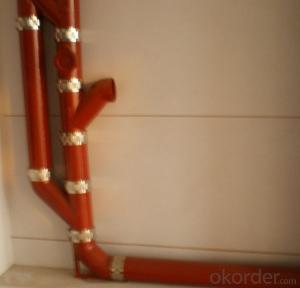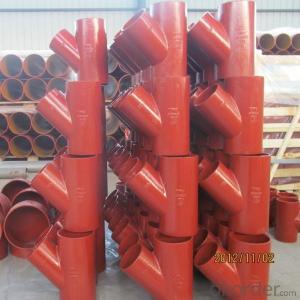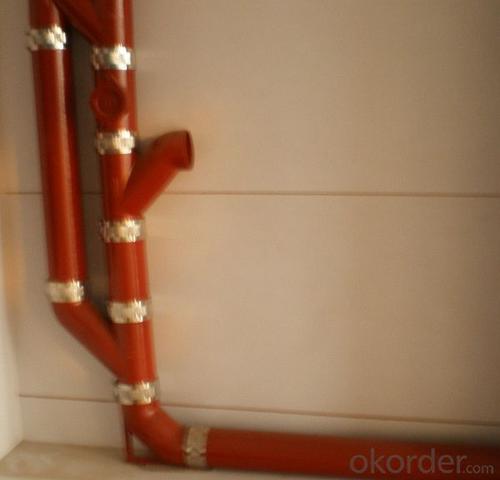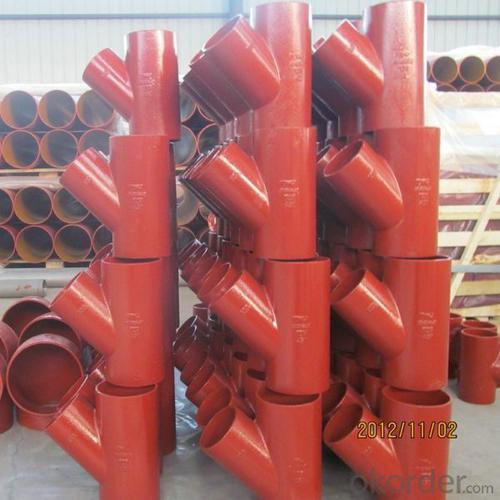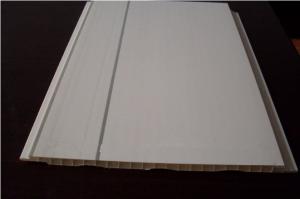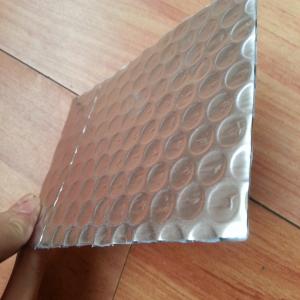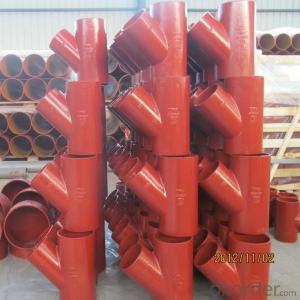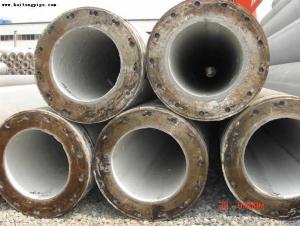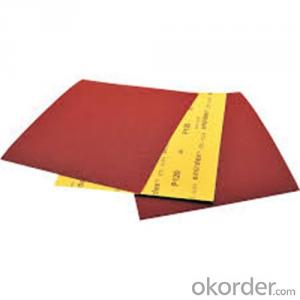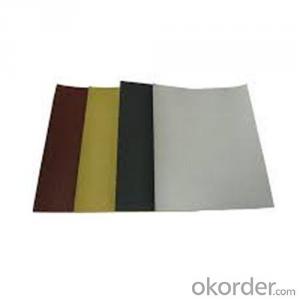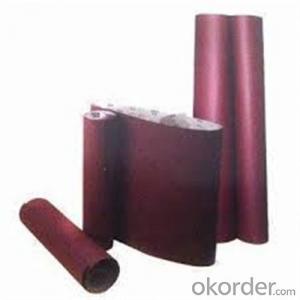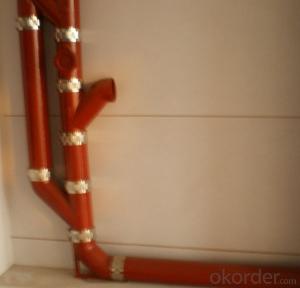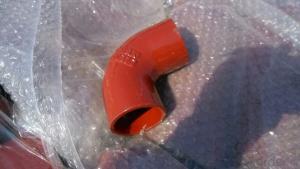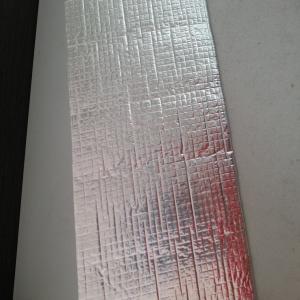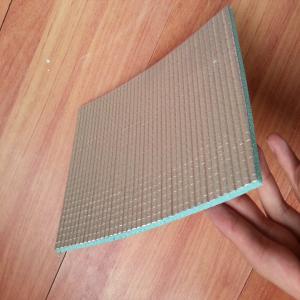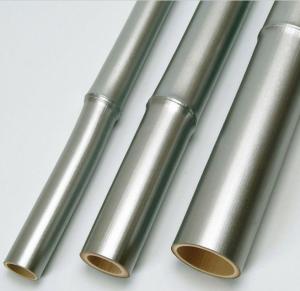EN877 - CAST IRON FITTINGS- DRAINAGE
- Loading Port:
- China Main Port
- Payment Terms:
- TT OR LC
- Min Order Qty:
- -
- Supply Capability:
- -
OKorder Service Pledge
OKorder Financial Service
You Might Also Like
Made from 100% recyclable materials, CMAX epoxy cast iron pipe systems are not only environmental friendly, but also satisfy many properties necessary to withstand the aggressive conditions both internal and external of the pipes and fittings: these properties include its excellent resistance to abrasion, corrosion, impact and fire. CMAX also has low noise transmission compared to common UPVC drainage pipe systems. CMAX is designed as long lasting building materials.
Standard:
CMAX epoxy cast iron pipe systems with nominal size between 40-300mm comply with BS EN 877.BS EN 877 guarantees the quality of the materials, dimensions and tolerances, mechanical properties(like water pressure, tensile strength and brinell hardness) appearance, and the standard coating for the epoxy cast iron pipes, fittings and couplings.
Strength:
Iron is well known for its strength and abrasion resistance. The shape and impact strength of CMAX products are unchanged under exposure of sunlight and weathering, while UPVC and PVC pipes would soften, deform and become brittle under intense temperature change.
Quiet:
CMAX’s sturdy and dense properties reduce pipe vibration a silent drainage system.Studies had proven iron is the quietest material out of all other common drainage system.
Non-Toxic and Non-Combustile:
No toxic gas will be emitted from CMAX in the event of fire. Iron is also non-combustile,so epoxy cast iron pipes and fittings are recoverable after fire.
Anti-Corrosive:
All CMAX epoxy cast iron pipes and fittings are internally and externally finished with corrosive resistant epoxy coating to prevent fouling and corrosion. The epoxy on CMAX epoxy cast iron pipes and fittings provides an excellent exterior under humid and tropical conditions.
Coupling:
Lightweight couplings are specially engineered to guarantee a strong, quick and easy connection between CMAX pipes and fittings. Made from stainless steel with rubber gaskets, the coupling match pipe and fittings non-corrosive properties.
- Q: I am planning to move to Daytona Beach and was wondering which Real Estate was reliable. I have looked on the internet and the majority of the Real Estate had very bad ratings and comments. It would be nice not to be tricked or cheated for my money. Thank you
- real estate has no feelings and does nothing; it is an inanimate thing. i think you are taking about a real estate AGENCY. CALL 3 AGENCIES and ask to talk to a buyer's agent. =[the one's that seem unethical, are dual agents/aka listing agents] can guide further
- Q: i am looking into becoming an agent, i have my license but have not sold a home yet.. i am really hurting with money, i am working a full time job at night and currently supporting 3 kids and my wife. is it worth it to put all my extra time in starting my real estate career and suffer with the gas going up or is real estate so bad now and am i just wasting my time?
- Times are very hard right now in real estate. Depending on your area, it could be months before you get any sales as a new agent. Research a few areas around you, and see where homes are still selling and concentrate on that area. You will have expenses such as newspaper ads, flyers, etc. to help get your name out there... or do alot of calling of friends, family and acquaintances. It might not be the best time to be getting into real estate, but it really depends on the area. Good luck!
- Q: I'm getting my real estate license and was wondering if there are any salespeople in nashville who love their company they work with, and would like to share. thanks!
- Greg, Consider this... When you are new to the biz, you have no clients but you have friends and family who know that you are getting into real estate (or at least they should). And, since in the grand scheme of things you are an unknown. I would strongly suggest looking into a National or Worldwide company to 'hang your hat'. Branding in this biz is a very strong ally to your business. So, why not work for someone who constantly makes the general public aware of their existence. I have done that and benefit from it all the time. I'll give you a couple hints of my company's branding efforts: 1. Nobody in the world sells more real estate than... 2. red, white and blue balloon Good luck on your new career!
- Q: I have been in car sales and I cannot stand it. The hours are long and you are stuck in the same place for 10 to 12 hours at a time. I am wondering if real estate sales is similar or Is it much different?
- Residential experts - less complicated to get carry of financing, greater pool of skill tenants Cons - extra tenant hassles, hire controls could decrease your potential to boost rents advertisement experts - often long-term tenants, tenants normally to blame for all renovations and utilities, less complicated to evict for non-charge Cons - harder to get financing, in many circumstances longer vacancies between tenants, could be an excellent kind of opposition
- Q: The market seems to be cooling down. I read an article in the economist about a year ago that predicted something like this would happen. Do you think that Real Estate is just cooling down or could it be much worse? Give your opinion and some insights.
- I think its going to get worse.
- Q: I am a residential real estate Broker in New York. I've sold a few commercial properties (although I was met with resistence) and get clients from time to time looking for commercial listings but I find it difficult to help them as the commercial real estate industry is like this secret society. Certain companies will only work with other commercial real estate brokers, Websites ALL require passwords and paid memberships and half of those websites are inaccurate on multiple levels. WHat is the point of this? Wouldn't it be easier to just make this information readily available to all??? Wouldn't more deals be done? If joe wanted to buy a space fr his clothing store wouldn't it get done quicker if all he did was type in commercial real estate for sale and 30 free websites popped up??? I just struggle to see the point.
- It isn't secretive, it is just completely different from residential real estate. Generally speaking, residential agents have no business thinking that they know enough about the commercial side of things to represent someone. There is a ton of stuff that applies to commercial real estate that residential brokers are never exposed to and trying to work with a residential broker is frustrating because they don't understand a lot of what is going on. Would you use a commercial broker to sell your house for you? Of course not.
- Q: I need to open a real estate company in Los Angeles, however i am not a licensed broker. I do have a partner that is willing to be the broker on record for my company. (1) how do I go about that ie.. what forms?(2) does the person that is going to be broker on record have to be an officer of the company?
- If you assess round you're going to ordinarily uncover the typical rate for a vacant lot is towards 10%. The motive for that is it can be tougher to promote a vacant lot for your discipline, and the income rate is far scale down than promoting a residence, which means that the agent makes much less cash. In my discipline, land is anyplace from 20 to forty% of the importance of an elevated estate. So if neighboring houses are promoting for $500K, then your lot could promote for $100K to $200K. An agent might take a directory for a residence and make five% of $500K that's $25,000 or he might record your lot for five% of $200K, that's $10,000. I recognise which directory I could take!! Sure he is not doing open residences, however the ones are a funny story anyways. Any well dealer will inform you open residences have just one role; to make the Seller think well. As anybody else intelligently talked about, you get what you pay for!!!
- Q: how many (if any) years of college does it take work for real estateto be able to work for them
- I don't think you need a college degree. What I understood from my realtor is that you have to take some classes and pass an exam.
- Q: I am strongly considering trying to land a job in real estate and I was wondering what the pros and cons of the job might be. Right now I am taking real estate related classes working towards a business degree. Thank you!
- I used to speak with a truly property agent a number of days per week, at a website online unrelated to earnings. She probably recounted the abnormal sales--she could not anticipate being competent to fulfill her loan or go shopping except she'd been well approximately saving and not anything unforeseen had arise. Some months she did good, others no longer. It stricken her having to be on it doesn't matter what her truly temper used to be. Sometimes she resented riding folks to peer a bazillion residences however them in no way making up their minds. She did not like having to drop the whole thing if a sale used to be viable--however effectively admitted she'd exhibit a condominium on Christmas morning, or leave out her little one's college play, if it supposed she received her fee.
- Q: How difficult is it to become a real estate agent in Beverly Hills or Malibu or Bel Air ECT places like that? How would you go about getting into a brokerage in the area? Any information you think I should know that I didn't ask of?
- Not difficult at all. First you go to Real Estate Sales Agent School and if you pass the course and exam, you apply for your license to be a sales agent. Once you have your license, you go to several real estate offices and apply for a job as a sales agent. Once you have been a sales agent under the guidance of a Broker for 3 yrs, you can go back to Real Estate School and study to become a Broker. Once you have your Brokers license, you can open your own office anywhere you want.
Send your message to us
EN877 - CAST IRON FITTINGS- DRAINAGE
- Loading Port:
- China Main Port
- Payment Terms:
- TT OR LC
- Min Order Qty:
- -
- Supply Capability:
- -
OKorder Service Pledge
OKorder Financial Service
Similar products
Hot products
Hot Searches
Related keywords
